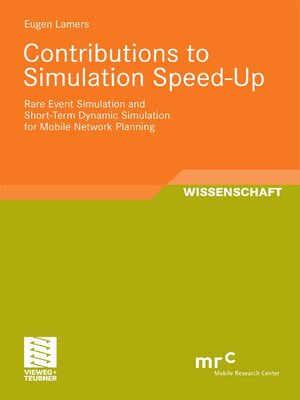Contributions to Simulation Speed-Up
ebook ∣ Rare Event Simulation and Short-Term Dynamic Simulation for Mobile Network Planning · Advanced Studies Mobile Research Center Bremen
By Eugen Lamers

Sign up to save your library
With an OverDrive account, you can save your favorite libraries for at-a-glance information about availability. Find out more about OverDrive accounts.
Find this title in Libby, the library reading app by OverDrive.



Search for a digital library with this title
Title found at these libraries:
| Library Name | Distance |
|---|---|
| Loading... |
For the simulation of stochastic systems, those techniques are essential which are able to speed up the simulation, i.e. the equivalent of increasing the accuracy that can be reached within a given run-time, especially with a focus on rare events.
Eugen Lamers explains the principle of simulation speed-up in general, demonstrates the technique RESTART for the simulation of rare events, and addresses its efficiency on distributed systems. Due to the character of RESTART, the efficiency is limited by the high communication overhead. The author introduces the Short-Term Dynamic Simulation concept, developed for the planning of mobile radio networks, which enables fast state space coverage along with the consideration of dynamic aspects. He analyses the speed-up potential on a theoretical basis with analytically solvable Markov models for different utilisations. With realistic models for UMTS network planning he shows that the evaluation of dynamic performance measures benefits from the Short-Term Dynamic Simulation technique.
Eugen Lamers explains the principle of simulation speed-up in general, demonstrates the technique RESTART for the simulation of rare events, and addresses its efficiency on distributed systems. Due to the character of RESTART, the efficiency is limited by the high communication overhead. The author introduces the Short-Term Dynamic Simulation concept, developed for the planning of mobile radio networks, which enables fast state space coverage along with the consideration of dynamic aspects. He analyses the speed-up potential on a theoretical basis with analytically solvable Markov models for different utilisations. With realistic models for UMTS network planning he shows that the evaluation of dynamic performance measures benefits from the Short-Term Dynamic Simulation technique.







